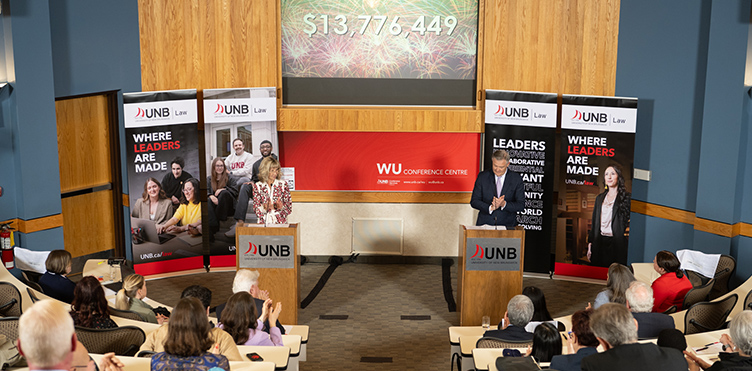
On May 16, 2025, the Wu Centre played host to a defining moment in the history of UNB Law. Alumni, faculty, students, and members of the wider legal community gathered to celebrate the public launch of Where Leaders Are Made—the most ambitious fundraising campaign in the history of the Faculty. Guided by campaign cabinet co-chairs and event emcees, Lydia S. Bugden, K.C. (LLB’91) and Vaughn MacLellan (LLB’95), the launch event was both a celebration of progress and a strong statement of intent. UNB Law formally announced its $23 million campaign goal and shared the incredible news that more than half of that target—$13.7 million—has already been secured. It was a powerful beginning to a campaign that promises to shape the future of legal education in New Brunswick and beyond.
UNB President and Vice Chancellor Paul Mazerolle has been one of UNB Law’s most dedicated champions, whose steady support and encouragement have energized the campaign from the very beginning. At the launch event, he set the tone with his opening remarks that underscored how UNB Law’s vision aligns seamlessly with the University’s broader strategic goals.
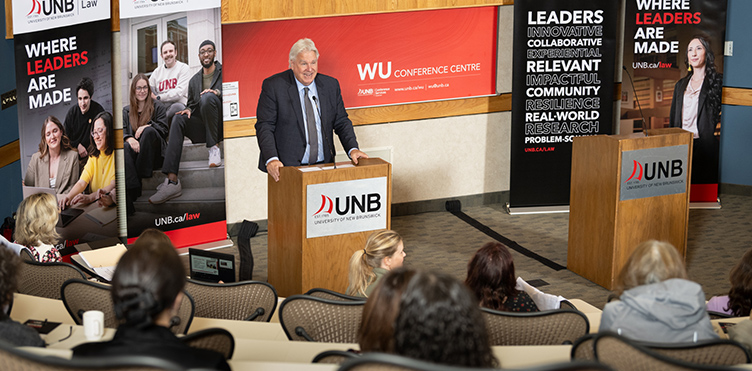
“The future of UNB Law is unequivocally one of the university’s—indeed one of my—highest priorities. I'm convinced that the bold strategic plan that the Faculty of Law is currently embarking on will re-establish UNB Law as one of the top five law schools in Canada. We're excited about that. We know it's possible and we want to support it. This means that UNB Law has a major contribution to make not only to its own future but also to the university’s strategic vision, UNB Toward 2030…As President, I am determined to see UNB Law succeed”
In his address, Dr. Mazerolle highlighted the Faculty’s expansion of experiential learning—through the Legal Clinic, and plans for the new Legal Observatory and Canada’s first virtual reality law lab—as a direct contribution to the University’s pillar of transformative education for the future. He pointed to UNB Law’s deep engagement with the legal community, its commitment to Truth and Reconciliation initiatives, and its focus on student wellness and mentorship as clear examples of impact and people-centered excellence. Looking ahead, he noted, the move to a modern, accessible, and technologically advanced Justice Building in downtown Fredericton embodies the University’s goal of creating sustainable, integrated institutions, ensuring UNB Law remains a dynamic home for future leaders.
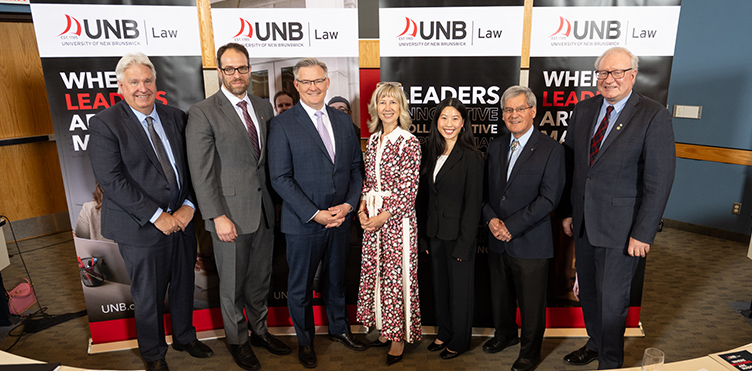
The launch was also an opportunity to celebrate an extraordinary series of new commitments to the campaign. The law foundations of Nova Scotia, Prince Edward Island, and Newfoundland and Labrador have pledged more than $1.4 million to strengthen scholarships for students from their provinces.
The Hewitt Foundation, one of Canada’s largest private charitable foundations, has joined with a $2 million gift to help renew the Justice Building as UNB Law’s future home. Established in 2017 following the sale of Hewitt Equipment and Atlantic Tractors and Equipment, the foundation is dedicated to sustainable change in Quebec and Atlantic Canada.
Individual donors have also stepped forward in inspiring ways. Over the past year, UNB Law announced on social media the $1 million commitments of alumni Earl Brewer (LLB’74) and Wayne Carson (LLB’90). At the launch, they were joined by a third graduate making a historic $1 million contribution: former Dean and current Chancellor Wade MacLauchlan (LLB'81). The Chancellor’s generosity stands among the largest alumni gifts ever made to UNB Law, and his remarks at the event underscored his commitment to advancing the faculty’s vision:
“It has never been more important for UNB Law to stand out in our region and country, to show new leadership in legal education and research around the core values that have always been our hallmark...With this campaign, we pay it forward to support future generations of law students and to make UNB Law an even more outstanding leader in legal education. When we invest in a bright future for UNB Law, we invest in ourselves.”
The Hon. Graydon Nicholas and his wife, Beth, followed Chancellor MacLauchlan with an announcement of their own: a donation of more than $200,000 to establish the Hatchette and Nicholas Law Scholarship for Indigenous law students. The scholarship, created in memory of Beth’s brother, Rick Hatchette (LLB’81), and their son, Michael Nicholas, is valued at $10,000, with $6,000 awarded in the first year and $4,000 in the second year, based on academic achievement.
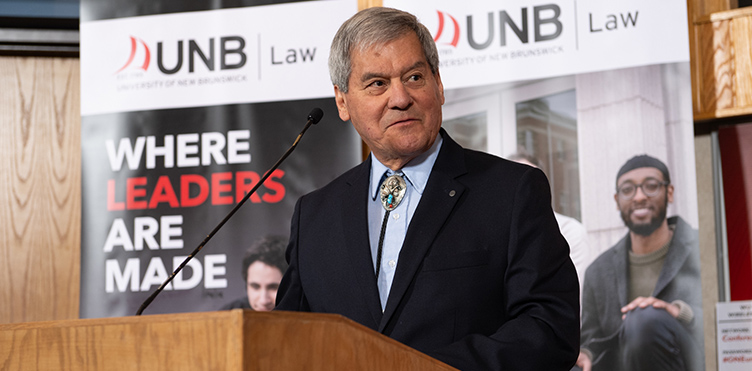
“I've had the privilege of serving in many rewarding positions during my lifelong mission to raise awareness about the rights of Indigenous peoples, due in large part to UNB Law. Beth and I want to pass that opportunity on to future generations of my people. The study of law is important in understanding and in utilizing Indigenous legal principles while gaining the knowledge to navigate the Canadian legal system. It provides a foundation to advocate for Aboriginal rights, treaty rights, self-determination, and to reclaim sovereignty as nations. It prepares us to address colonial legacies and to promote reconciliation. More importantly, a background in law empowers indigenous leaders and communities.”
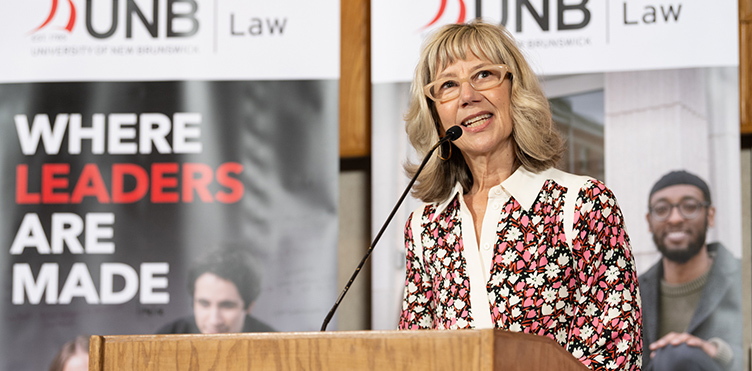
At the heart of Where Leaders Are Made is a distinguished campaign cabinet whose leadership, generosity, and vision are driving the initiative forward. Led by co-chairs Bugden and MacLellan, the campaign cabinet brings together leaders from across the legal profession, business world, and public service, including Wayne Carson (LLB‘90), Simone Cole (LLB‘06), Janet Hoyt (LLB‘84), Lawson Hunter, C.M., K.C. (LLB‘70), Thomas Isaac (LLB‘91), H. Wade MacLauchlan, C.M., O.PEI (LLB‘81), Patrick McNally (LLB‘11), David O’Brien, K.C. (BBA‘71, LLB‘73), and Michael Sherrard (LLB‘90).
“They are lead volunteers opening doors for our dean, our president, and our campaign staff,” Bugden reflected on her colleagues’ contributions. “They energize us and spread the word through their personal and professional networks. They devote their time, talents, and energy to making the campaign an overwhelming success. 100% of our cabinet have made financial commitments to the campaign and together our contributions total $2,711,939.72.”
We have two exceptional co-chairs in Lydia Bugden and Vaughn MacLellan, who’ve championed our law school for decades through thick and thin. The other members of the campaign cabinet, who represent four decades of UNB Law graduates, are among our finest. They bring a proven track record of getting things done and a deep commitment to our institution.
At the launch event, it became clear that the Where Leaders Are Made initiative is about more than fundraising—it’s a vision for the future of UNB Law. Central to that vision are four strategic pillars, each representing an essential investment in the Faculty, its students, and the broader communities it serves. Together, they form the foundation for an ambitious $23 million effort that will transform legal education in Fredericton and beyond.
UNB Law is defined by its close-knit learning environment, where small class sizes foster mentorship, collaboration, and rigor. To ensure that every talented student can access this experience, regardless of financial means, the campaign aims to increase needs-based scholarships by at least $200,000 annually. This investment will open doors for an additional 50 students each year, strengthening equity and accessibility in legal education.
The acquisition of the Fredericton Justice Building offers a once-in-a-generation opportunity to reimagine the learning spaces of UNB Law. Plans include fully accessible classrooms, a simulated courtroom, and Canada’s first virtual reality law lab. These innovations will create a dynamic environment where theory meets practice, preparing students for the realities of a rapidly evolving profession.
UNB Law is renowned for its “career-ready” curriculum, grounded in timeless fundamentals and enriched by practical training. With support from the campaign, the Faculty will expand its Legal Clinic, develop new internship opportunities, and establish the UNB Legal Observatory—bringing real legal proceedings into the classroom and ensuring students graduate ready to lead.
As a law school with deep roots in community and policy, UNB Law is uniquely positioned to tackle pressing challenges such as sustainable development, reconciliation, and access to justice. This pillar will launch a new Master of Studies in Law degree, fund legal research chairs, post-doctoral fellowships, and graduate scholarships, and provide seed funding for transformative projects that bridge research and impact.
“In launching this campaign, we’re not selling a dream that was conceived in the ivory tower,” said Dean Marin. “We’re moving to the next phase of realizing the concrete objectives that we set together. And that’s why this campaign is resonating…And no law school in Canada is better placed to tackle the challenges facing the legal profession and the administration of justice than UNB Law. That’s because our vision is rooted in embedding legal education and research in the world around us.”
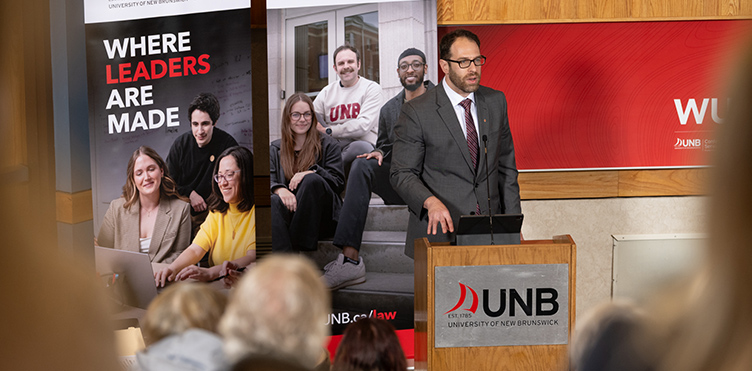
The success of Where Leaders Are Made is built on the passion, commitment, and generosity of a community united by a shared belief in the power of legal education to shape the future.
“We are turning to our graduates, to our friends, to government, and to the philanthropic community for demonstrated belief in and support of UNB Law,” said Dr. Mazerolle.
Every gift strengthens our students, classrooms, and research, ensuring UNB Law continues to produce leaders who make a difference in New Brunswick, across Canada, and beyond. With a goal of $23 million, this campaign will support the people, places, and programs that will define the next century for UNB Law. Together, we can affirm our place among Canada’s top law schools and ensure that UNB Law remains—now and always—a place where leaders are made.
“This campaign starts with high expectations,” added the Chancellor. “Let’s exceed them…Take our turn to pay it back—to the best of our ability—to the law school that has done so much for us, and pay it forward for the future beneficiaries of this campaign.”
Dean Marin closed the launch with a call to action that underscored both the remarkable progress already achieved and the work still ahead:
“The total contributions to date are twice the cumulative value of gifts to UNB Law in its entire history,” said Dean Marin. “In other words, in the last three years, we have raised double what UNB Law raised in the preceding 130. But we can’t stop there. If we’re going to realize UNB Law’s enormous potential, we need to do more…There’s lots more work to do, and there is little glory in making it part of the way. If you believe in our vision and the work we do, then please join this campaign by contributing what you can. Together, we’ll realize UNB Law’s full potential.”